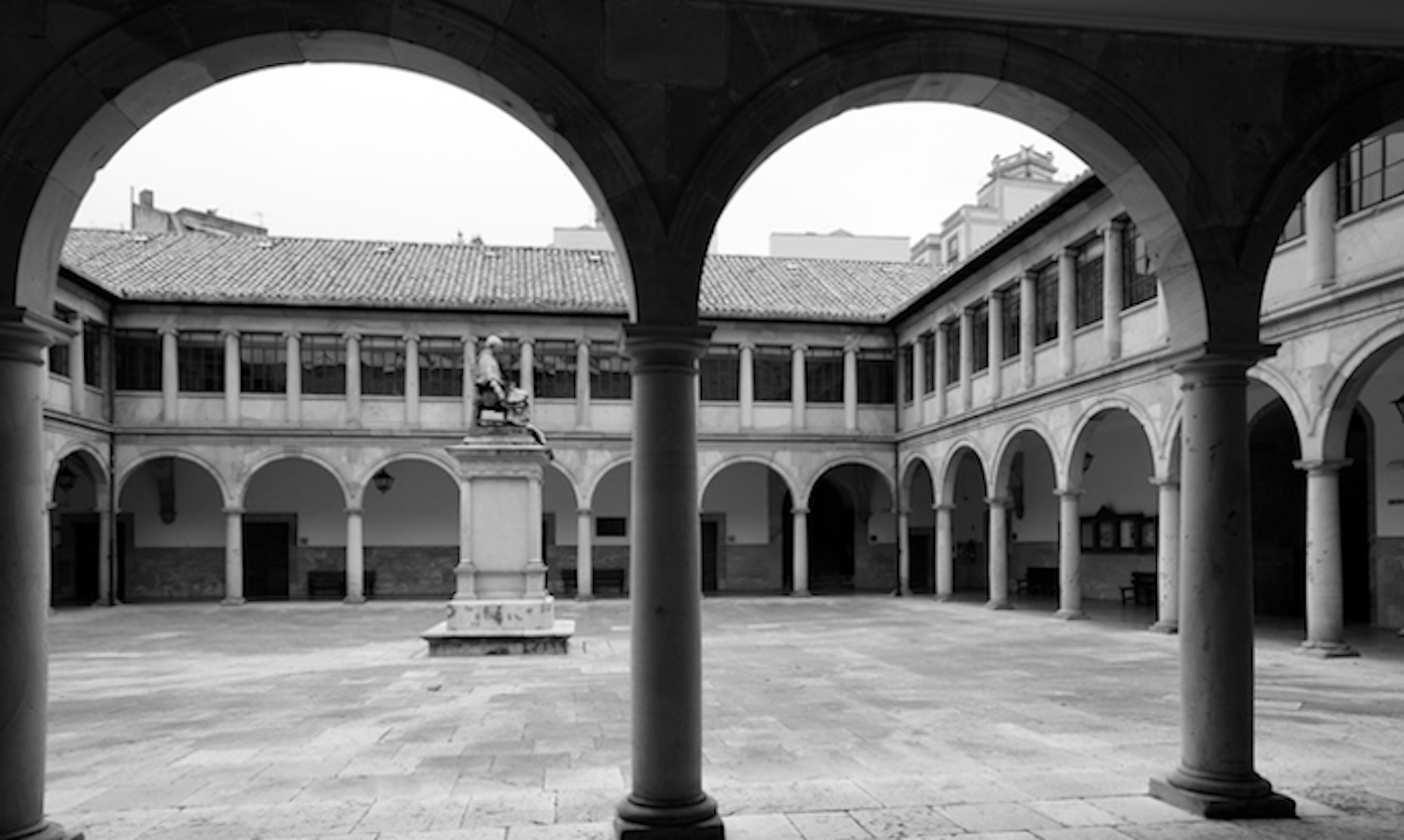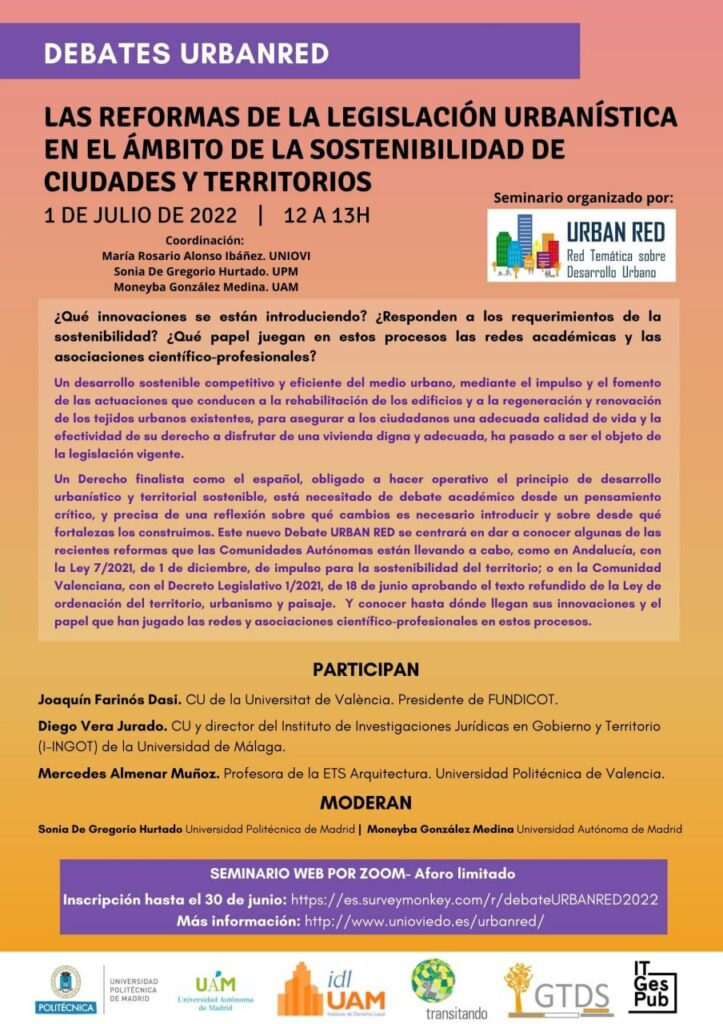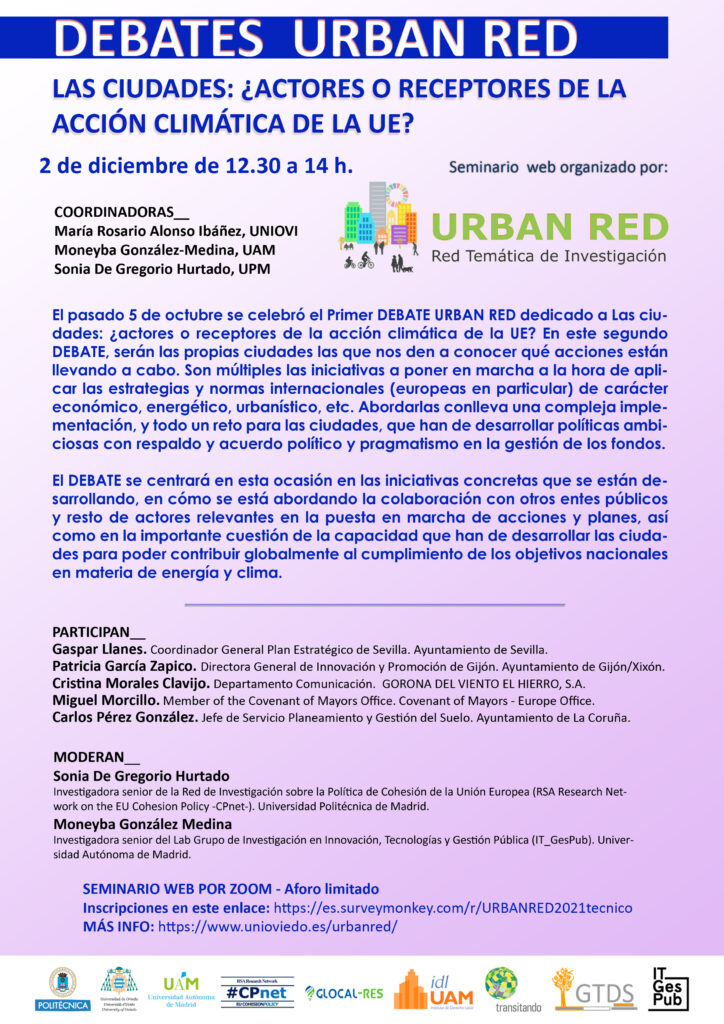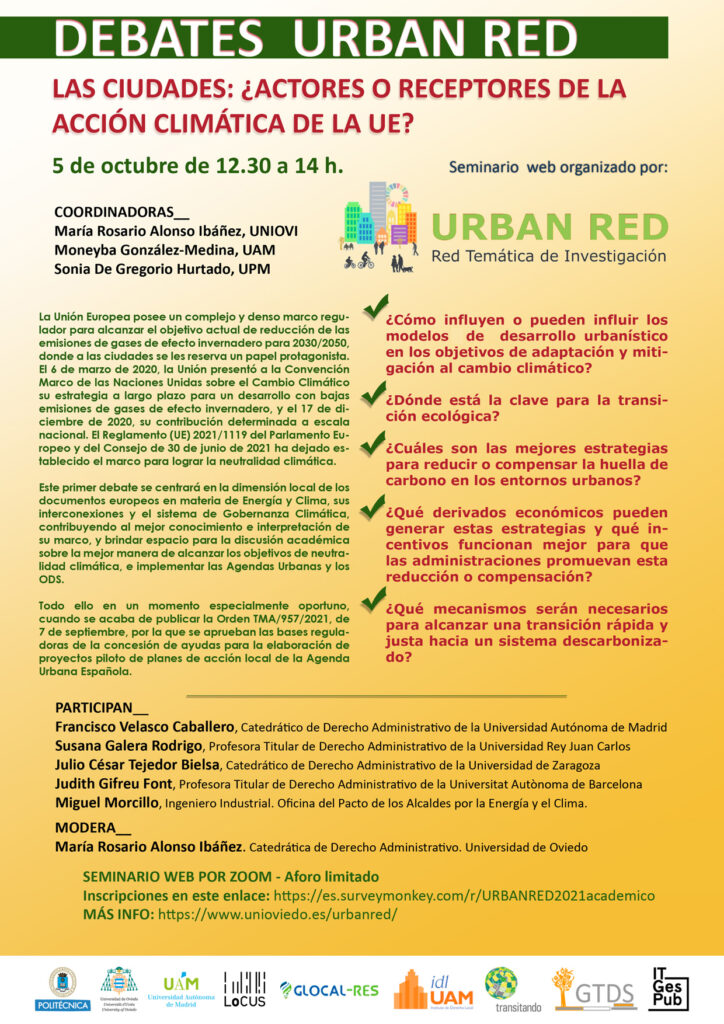Reforms of urban planning legislation in the field of sustainability of cities and territories
July 1, 2022 / 12 to 13 h.
Third debate
On July 1, 2022, the third DEBATES URBAN RED Webinar took place, entitled "The reforms of urban planning legislation in the field of sustainability of cities and territories". It brought together leading experts from the academy around the changes that need to be made to urban and territorial legislation and from what strengths we can do it. Joaquín Farinós Dasi participated . Professor of Geography at the University of Valencia, and president of FUNDICOT; Diego Vera Jurado, Professor of Administrative Law at the University of Malaga, and Director of the Institute of Legal Research in Government and Territory (I-INGOT) of the University of Malaga; and Mercedes Almenar Muñoz, Professor of the ETS Architecture, of the Polytechnic University of Valencia. The debate was presented by María Rosario Alonso Ibáñez, director of URBAN RED, and moderated by Sonia de Gregorio Hurtado (UPM) and Moneyba González Medina (UAM), coordinators of the network.
On this occasion, the objective of the debate was to know if a finalist law such as the Spanish one, obliged to make operational the principle of sustainable urban and territorial development, is introducing innovations and regulatory changes that allow responses to the challenges posed. To this end, issues such as the scale of intervention for actions in the urban environment, the problems related to the management of actions in this environment, and the suitability or not of the classic action systems were discussed, if urban regeneration actions with different content to those of urban rehabilitation are contemplated, whether instruments of intervention in the city other than urban planning are regulated, whether the need for indicators on the ecological footprint is contemplated, how urban-rural relations are articulated, or what mechanisms of participation may or may not be contemplated in the legislation beyond the procedures of public information, among many other issues.
In particular, it reflected on some of the recent reforms that the Autonomous Communities are carrying out, as in Andalusia, with Law 7/2021, of December 1, on the promotion of the sustainability of the territory; or in the Valencian Community, with Legislative Decree 1/2021, of June 18, approving the revised text of the Law on territorial planning, urbanism and landscape. And to know how far their innovations go and the role that scientific-professional networks and associations have played in these processes.
The content of the seminar can be accessed through the link available on this page.
Cities: actors or recipients of EU climate action?
December 2, 2021
Second debate
On December 2, the second URBAN RED DEBATES Webinar took place, entitled "Cities: actors or recipients of EU climate action?". On this occasion,the protagonists were the cities of Gijón and A Coruña and the island of El Hierro.
The cases were presented by technical and communication representatives from these territories, who, in addition to sharing their experience, exchanged impressions with each other and answered the questions of the attendees. Patricia García Zapico (General Director of Innovation and Promotion of the City of Gijón), Cristina Morales Clavijo (Department of Communication of the entity Gorona del Viento El Hierro, S.A.) and Carlos Pérez González (Head of the Planning and Land Management Service of the City of A Coruña) intervened. The debate was presented by María Rosario Alonso Ibáñez, director of URBAN RED, and moderated by Sonia de Gregorio Hurtado (UPM) and Moneyba González Medina (UAM), coordinators of the network.
The objective of the seminar, complementary to the one held on October 5, was to generate a space to know first-hand the climate action that cities and other unique local territories such as islands are deploying. To this end, questions were raised such as the extent to which such action had been influenced by national or international strategies; how the initiative came about; what kind of capabilities were needed for its design and implementation and what resources were mobilized.
Based on these questions, the importance of international agendas (including national ones) to "order" local action and give these territories the opportunity to be recipients of aid, but, above all, to be actors of change, was recognized. For example, in the case of Gijón, the impulse started with an energy audit project promoted by the EU, benefiting from a series of grants from the IDAE, which led to the establishment of collaborative relationships with technical developers to put their expert knowledge at the service of the city. For its part, the island of El Hierro promoted in 2014 the Gorona del Viento hydro-wind power plant, a unique project in the world, with the aim of alleviating the island's great energy dependence and the extra cost of communications. The project required mobilizing a significant volume of economic, managerial and scientific knowledge resources. In the case of A Coruña, the Strategy Against Climate Change has been a key piece to frame the city's climate action and order its coastline to make it less vulnerable, in line with the "environmental precautionary principle".
The experience accumulated by the cases in the energy sector, as well as in other related areas such as sustainable mobility, urban planning, digital transformation or R + D + i, has meant them as innovative territories, whose action has been recognized nationally and internationally as good practice.
To achieve this success, in all cases the importance of citizen participation and the establishment of alliances with public and private actors, as well as insertion in exchange networks, has been underlined. They also highlighted the role of the benefits and bonuses included in the tax ordinances, the economic aid from other administrations or entities (especially from the EU), and more recent initiatives such as local energy communities, in which citizens have a very important role. And, as one of the guests pointed out, "it is a challenge of the territory, but above all of the people".
As a great challenge, in addition to the technical learning and the high economic cost required by this type of intervention, the need to overcome internal inertia and resistance to change, which hinder the implementation of innovations in the territory, was discussed. Also, to carry out a good management of the funds, a particularly relevant issue in the face of the Next Generation Funds.
Finally, the content of the seminar can be accessed through the link available on this page.
In 2022, URBAN RED will continue to organize new webinars to address various issues related to sustainable development with an open and multidisciplinary approach, focusing on the local level. From URBAN RED our vocation is not only to generate a space for debate, but to promote reflection and exchange between the Academy, public administrations, private entities and civil society, and citizens in general. To this end, we will continue to work, so we are waiting for you.
October 5, 2021
First debate
On October 5, the DEBATES URBAN RED Webinar was held dedicated to Cities: actors or recipients of EU climate action? It was attended by Susana Galera (URJC), Julio Tejedor (UNIZAR), Judith Gifreu (UAB), Francisco Velasco (UAM) and Miguel Morcillo (Office of the Covenant of Mayors for Energy and Climate). The debate was moderated by María Rosario Alonso, director of URBANRED.
Based on a series of questions, the interventions focused on the difficulties that local governments face when implementing international strategies and standards, in general and European, in particular, related to climate action. In this sense, beyond substantive activities grouped in plans or strategies for both mitigation and adaptation, emphasis was placed on how these activities are organized, since they need the involvement of multiple actors who find at the local level the necessary space in which to coordinate, cooperate and act. In addition, there are multiple instruments and tools to be implemented, of a regulatory, economic, energy, urban planning, etc. nature, which makes its implementation more complex, and a challenge for municipalities.
With a horizon in which the budgetary factor seems to no longer be the traditionally limiting, even in a very competitive environment, cities will be protagonists of policies that will be very relevant to climate action. The approach of these strategies and plans will be determined by the institutional impulse of local governments, although not only. The Covenant of Mayors for Energy and Climate can serve as a basis for addressing these local climate action policies, given that it is a tool with a path, and with a good basis for planning actions in a logic of coordination and multilevel governance, such as those needed by challenges such as those we face due to climate change. The Urban Agenda must also serve as an adjunct to the different local climate actions, since the territorial base of the municipalities is a key piece in their contribution to climate change. To facilitate the achievement of international climate objectives, ambitious policies must be developed, with political support and agreement and with pragmatism in the management of funds so that they reach municipalities and can respond to their needs and, with them, contribute globally to the fulfillment of national objectives.
This Debate is complemented by the one that will be held on November 2, from 12.30 to 14 h., also online, and that will have the perspective of the cities, directly involved in the design and execution of local climate action policies.
Cities: actors or recipients of EU climate action?
Coordinators:
María Rosario Alonso Ibáñez (UNIOVI)
Moneyba González-Medina (UAM)
Sonia De Gregorio Hurtado (UPM)
Participate:
Francisco Velasco Caballero, Professor of Administrative Law at the Autonomous University of Madrid
Susana Galera Rodrigo, Professor of Administrative Law at the Rey Juan Carlos Julio César
Tejedor BielsaUniversity , Professor of Administrative Law at the University of Zaragoza Judith
Gifreu Font, Professor of Administrative Law at the Autonomous University of Barcelona Miguel
Morcillo, Industrial Engineer.
Office of the Covenant of Mayors for Energy and Climate
Moderates:
María Rosario Alonso Ibáñez, Professor of Administrative Law at the University of Oviedo



